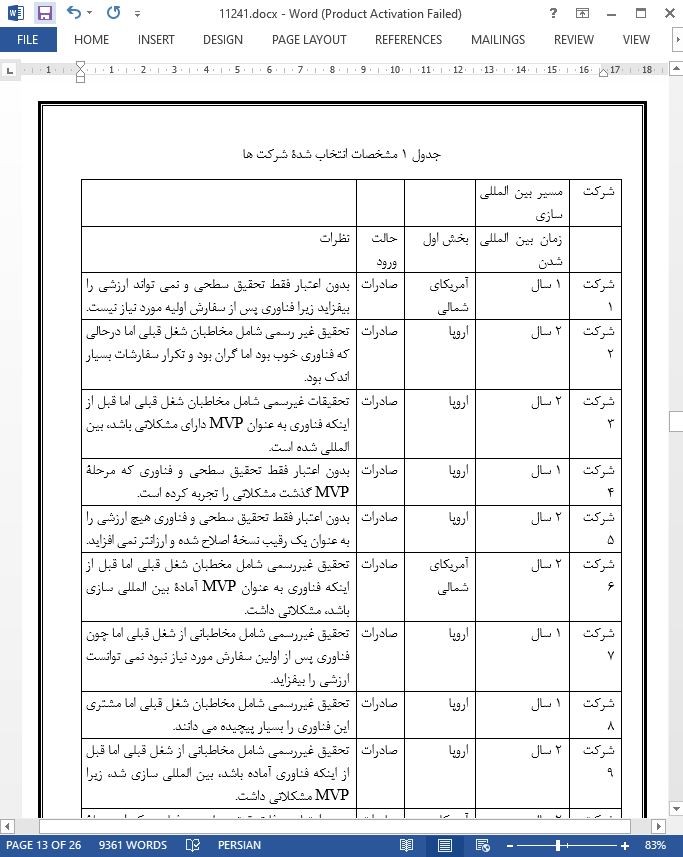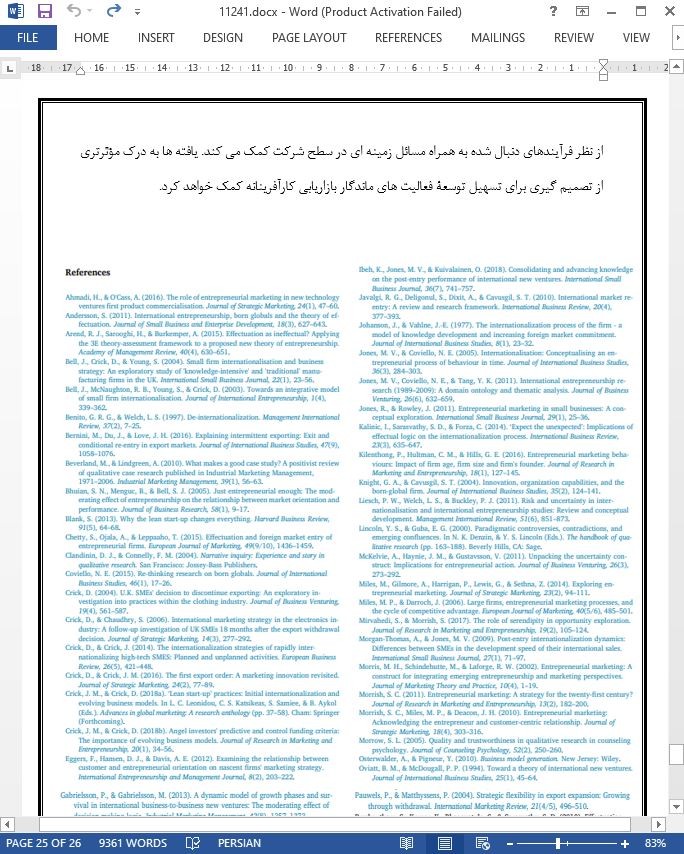
تصمیم گیری بازاریابی کارآفرینانه درمورد بین المللی سازی سریع شرکت های نوپا
چکیده
این تحقیق با استفاده از دیدگاه اثربخشی برای کمک به دانش مربوط به شیوه های بازاریابی کارافرینانۀ شرکت هایی که به سرعت درحال بین المللی شدن هستند و پس از آن به طور موقت فروش خارجی آن ها متوقف می شود، کاربرد دارد. تحقیق فعلی مهم است زیرا مطالعات قبلی بر ادامۀ فعالیت در بازارهای خارجی متمرکز بودند نه خارج شدن از بازار بین الملل. قبل از بین المللی سازی مجدد برنامه ریزی شده، مصاحبه های نیمه ساختاری با مدیران مالک شانزده شرکت نوپای دانش بنیان بریتانیایی کوچک صورت گرفت. کلیۀ تیم های مدیریتی فعال بودند، خطر کردند، از نوآوری استفاده کردند و رفتاری فرصت طلبانه و استفاده از منابع را درپیش گرفتند. درمقابل ایجاد «ارزش مشتری» به اندازۀ کافی صورت نگرفت. این تحقیق مشخص می کند که در زمینه های خاص، جوانب خاصی از یک رویکرد اثربخشی از دیگر جوانب آن فراتر است و مفهوم «ضرر مقرون به صرفه» هم به لحاظ مالی و هم غیر مالی در نظر گرفته شده است. این تحقیق نگرش های بی نظیری درمورد نیاز تصمیم گیرندگان شرکت هایی که به سرعت بین المللی می شوند دارد تا اعتبار راهبردهای کشف مشتریان جدید و همچنین پتانسیل سودمندی برای ازدست دادن مشتریان خاص، حتی به طور موقت برای تسهیل فعالیت های ماندگار بازاریابی کارآفرینانه را بسنجند.
1. مقدمه
1.1 هدف تحقیق
هیلز و هالتمن (2011، ص. 3) بازاریابی کارآفرینانه (EU) را «به عنوان یک روح، یک جهت گیری و همچنین فرآیند تعقیب فرصت ها و راه اندازی و سرمایه گذاری های روبه رشد در نظر گرفتند که با استفاده از نواوری، خلاقیت، فروش، فرورفتن دربازار، شبکه سازی و انعطاف ازطریق روابط موجب ایجاد ارزش قابل قبول مشتری می شود». والن و همکاران (2016) نشان دادند که بازاریابی کارآفرینانه ناشی از عملکرد شرکت هایی است که در زمینۀ نامشخصی فعالیت می کنند، زمینه های مختلفی را برای چشم انداز بازاریابی سنتی ایجاد می کنند. با این وجود، بسیاری از شرکت های نوپا در زمینه های نسبی نامشخصی که در آن فعالیت می کنند، شکست می خورند (بلانک، 2013)؛ ازاین رو، موضوع «زمینه» برای درنظر گرفتن رفتار شرکت ها مهم است، زیرا بینش های منحصربه فرد از زمینه های خاص می تواند در دانش مؤثر باشد( جونز و رالی، 2011؛ رابر، دیمتراتوس و کووالاینن، 2017). درواقع، موریس، شیندوهوت و لافورج (2002، ص.1) اظهارداشتند: «بازاریابی به موقعیت بستگی دارد، اما موقعیت مدام درحال تغییر است». در این تحقیق، «خارج کردن از بازار بین المللی» موقعیت جذابی را برای مطالعۀ رفتار بازاریابی کارآفرینانه فراهم کرده، که خطر بالقوه یا حتی عدم قطعیت پیرامون روش های جدید فعالیت در بازارهای خارج از کشور را ارائه می دهد (کریک و کریک، a2018؛ لیش و باکلی، 2011؛ والن همبرگ و شوایزر، 2017).
5.2 نتیجه گیری
پژوهش حاضر با درک ما از خطر/پاداش در ارتباط با تأثیرگذاری ضررهای مقرون به صرفۀ مربوط به رویکردی اثربخش محور (ساراسواتی، 2001) کمک می کند؛ به ویژه این تحقیق دیدگاه هایی را در موررد تصمیم گیری برای رفتار تسهیل ماندگار بازاریابی کارآفرینانه پیشنهاد می کند. اولین نتیجه گیری از این تحقیق این است که عناصر تصمیم گیری اثربخش محور در شرایط خاصی بسیار مهم هستند. مفهوم درک شدۀ «ضرر مقرون به صرفه» پس از خارج شدن از بازار بین المللی رایج شد. دومین نتیجۀ مرتبط این است که ابعاد مختلفی از «ضرر مقرون به صرفه» مرتبط با مسائل مالی (مانند سودها) و غیر مالی(مانند اعتبار) وجود دارد. سومین نتیجه گیری این است که اعتبار کافی برای جلوگیری از تأثیر تصمیم گیرندگان در مورد پاداش های دریافتی مانند پذیرش سفارش غیرمترقبه جلوگیری کند که می تواند از در نظر گرفتن خطرات بالقوه فراتر رود. برای مدیران مالک مهم است که روند اعتبارسنجی مناسبی را در پیش گیرند که با فرآیند کشف مشتری منطبق باشد (بلانک، 2013؛ گاسمن و همکاران، 2014؛ استرولدر و پیگنوئر، 2010؛ ریس، 2011) به عنوان یک راهبرد کاهندۀ سریع و کم هزینۀ خطر قبل ازاستفاده از منابع محدود.
Abstract
This study utilises an effectuation lens to contribute to knowledge involving the entrepreneurial marketing practices of rapidly internationalising firms, following a temporary discontinuation of overseas sales. This is important since earlier studies typically focus on continuing overseas activities, not de-internationalisation. Semi-structured interviews took place with owner-managers of sixteen small, UK based, knowledge-intensive start-ups, before planned re-internationalisation occurred. All management teams were proactive, took risks, exploited innovation and engaged in opportunity-driven plus resource leveraging behaviour. Conversely, creating adequate ‘customer value’ did not occur. The investigation highlights that in particular contexts, certain facets of an effectuation approach outweigh others and the notion of ‘affordable losses’ is viewed in both financial and non-financial terms. The study offers unique insights into the need for decision-makers in rapidly internationalising firms to undertake validation of strategies to discover new customers; also, the potential usefulness to lose particular customers, even temporarily, to facilitate enduring entrepreneurial marketing activities.
1. Introduction
1.1. Research objective
Hills & Hultman (2011, p. 3) view entrepreneurial marketing (EM) “as a spirit, an orientation as well as a process of passionately pursuing opportunities and launching and growing ventures that create perceived customer value through relationships by employing innovativeness, creativity, selling, market immersion, networking, and flexibility”. Whalen et al. (2016) suggest that EM arises from the practices of firms operating under conditions of uncertainty, providing an alternative to the traditional marketing perspective. Nevertheless, many start-up firms fail given the relative conditions of uncertainty in which they operate (Blank, 2013); hence, the issue of ‘context’ is important in considering firms' behaviour, since unique insights from particular contexts can contribute to knowledge (Jones & Rowley, 2011; Reuber, Dimitratos, & Kuivalainen, 2017). In fact, Morris, Schindehutte, and Laforge (2002, p.1) note: “marketing is context dependent, but the context is continually changing”. In this current study, ‘de-internationalisation’ provides an interesting context in which to study EM behaviour, given the potential risk or even uncertainty surrounding new ways of operating in overseas markets (Crick & Crick, 2018a; Liesch, Welch, & Buckley, 2011; Vahlne, Hamberg, & Schweizer, 2017).
5.2. Conclusions
This current study contributes to our understanding of risks/rewards in light of affordable losses associated with an effectuation-based approach (Sarasvathy, 2001); specifically, it offers insights into decision-making to facilitate enduring EM behaviour. The first conclusion arising from this investigation is that elements of effectuation-oriented decision-making are more important in certain contexts. The notion of perceived ‘affordable losses’ was prevalent following de-internationalisation. The second related conclusion is that there are different facets of ‘affordable losses’ related to financial (like profits) and nonfinancial (such as credibility) issues. The third conclusion is that adequate validation is important to avoid decision-makers acting on perceived rewards, like accepting serendipitous orders that can outweigh consideration of potential risks. It is important for owner-managers to undertake appropriate validation procedures associated with a customer discovery process (Blank, 2013; Gassmann et al., 2014; Osterwalder & Pigneur, 2010; Ries, 2011) as a quick and low-cost risk minimisation strategy before limited resources are utilised.
چکیده
1. مقدمه
1.1 هدف تحقیق
1.2 مشارکت
2. مرور ادبیات
2.1 دامنۀ بازاریابی کارآفرینانه
2.2 تصمیم گیری اثربخشی محور
2.3 خارج شدن از بازار بین المللی و بین المللی سازی مجدد بالقوه
3. روش شناسی
3.1 بررسی اجمالی
3.2 جمع آوری داده
3.3 تحلیل
4. یافته ها
4.1 «مسائل» تشریح کنندۀ خارج شدن از بازار بین المللی
4.2 تصمیم گیری و پتانسیل بین المللی سازی مجدد در آینده
5. بحث، نتیجه گیری، پیامدها و تحقیقات آینده
5.1 بحث
5.2 نتیجه گیری
5.3 پیامدها
5.4 محدودیت ها و تحقیقات بیشتر
ABSTRACT
1. Introduction
1.1. Research objective
1.2. Contribution
2. Literature review
2.1. The EM domain
2.2. Effectuation oriented decision-making
2.3. De-internationalisation and potential re-internationalisation
3. Methodology
3.1. Overview
3.2. Data collection
3.3. Analysis
4. Findings
4.1. ‘Issues’ explaining de-internationalisation
4.2. Decision-making and potential future re-internationalisation
5. Discussion, conclusions, implications and future research
5.1. Discussion
5.2. Conclusions
5.3. Implications
5.4. Limitations and future research
- اصل مقاله انگلیسی با فرمت ورد (word) با قابلیت ویرایش
- ترجمه فارسی مقاله با فرمت ورد (word) با قابلیت ویرایش، بدون آرم سایت ای ترجمه
- ترجمه فارسی مقاله با فرمت pdf، بدون آرم سایت ای ترجمه



